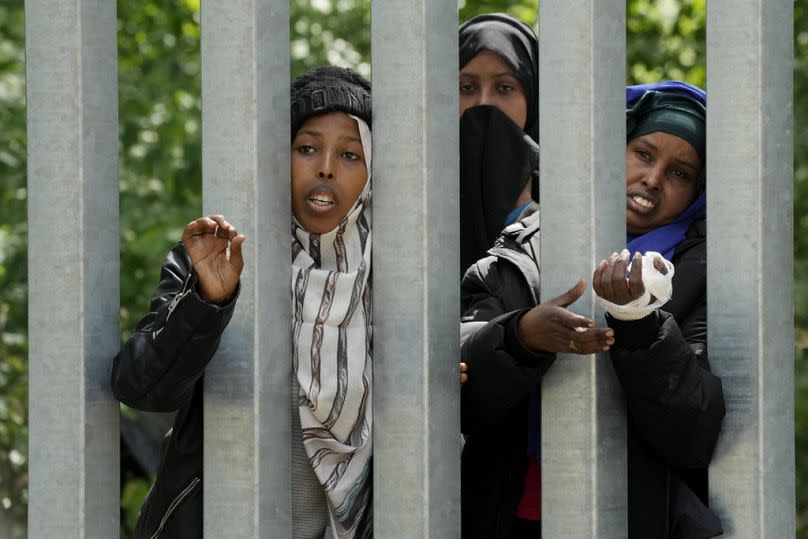New EU migration rules neglect cities’ needs and fail to uphold human rights

After eight years of negotiations, the European Union has finally agreed on a new set of rules under the New Pact on Migration and Asylum. However, instead of providing real-time solutions, this freshly agreed Pact seems to exacerbate existing problems.
Designed to establish a more coordinated and unified approach to handling migration and asylum across the EU, the New Pact ironically overlooks the crucial role of cities, which are at the forefront of providing essential services and integration policies for migrants.
Integration happens at the local level. Despite the continuous political dance of the EU and its member states around regulating migration, it is cities and municipalities that are making integration work.
The New Pact seeks to define Europe's duties towards migrants and refugees and establish a practical framework for action. However, we, as deputy mayors of the cities of Amsterdam and Vilnius, see several issues that pose potential obstacles to its effective implementation, with possibly dire consequences for both migrants and local authorities.
Embracing legal migration is an imperative
Europe has grappled with multiple crises in recent years, which have deepened existing inequalities and fuelled the rise of populism. This surge has led to heightened hostilities, increased alienation and resulted in a disturbing disregard for vulnerable groups, including migrants and refugees.
Although presented as "a set of new rules managing migration and establishing a common asylum system at EU level, that delivers results while remaining grounded in our European values," the New Pact largely reinforces the narrative of migration as a threat that must be controlled and mitigated.
By emphasising border protection, stringent screening processes, and externalising asylum procedures through agreements with non-EU countries, the New Pact frames migration in terms of security risks and burden management.
Concerningly, the New Pact neglects the fundamental principle that all human beings, regardless of their origin or reasons for migrating to the EU, deserve fair, dignified and humane treatment. While international law grants migrants the right to seek asylum in any EU member state, the Pact's focus on establishing processing centres at EU borders undermines this right.
Despite assurances of "independent monitoring," there is no guarantee that individuals detained in these "border-centres" will receive the legal assistance they are entitled to.

In addition, the screening regulation that should govern the intake and processing of people at the border fails to differentiate between regular migrants and vulnerable groups like unaccompanied minors. This could potentially lead to inadequate protection and support for those in need or even to the detention of minors during the processing of their applications.
These severe measures could affect often already traumatised migrants and lead to an increase in people taking their chances on alternate routes, resulting in more undocumented migrants ending up in cities across Europe.
Moreover, the New Pact largely maintains the problematic Dublin system, failing to address the lack of political solidarity among member states regarding a supposedly fair distribution of refugees across the Union.
Finnish PM urges parliament not to water down controversial deportation bill
New Dutch government wants an opt-out from EU migration policy. But is it possible?
Europe is grappling with demographic changes and a shrinking workforce. With birth rates declining and an ageing population, the demand for workers across various sectors, particularly in healthcare and technology, is soaring.
By streamlining legal migration pathways, instead of obsessing about fortifying the stronghold, Europe can attract skilled migrants who are eager to contribute. This approach not only addresses immediate labour shortages but also enriches European societies with diverse talents and perspectives, ensuring long-term economic growth and social cohesion.
Embracing legal migration is not just a policy option; it is an economic imperative for Europe's future. The European Union should take a hard and honest look at itself and the selective openness that it cultivates.
Cities like ours know how to help
The EU claims it wants to learn from successful integration policies, yet the New Pact fails to recognise the importance of local authorities in this process, which have proven on many occasions to be resilient in responding to today's geopolitical challenges.
Around 75% of Europe’s population lives in urban areas, where integration happens directly. However, the Pact presents numerous risks for cities. Increased responsibilities to accept refugees could strain local resources and services, especially without sufficient EU funding for integration programmes.
The Pact’s focus on border management rather than long-term integration is short-sighted when taking into account the need for skilled labour. Effective integration policies, implemented at local level, are essential for ensuring that refugees and migrants become productive members of their new communities.

Cities like ours acknowledge the unique needs of those fleeing war and political oppression and have extensive experience in integrating newcomers, from offering language courses to labour market integration programmes.
Investing in sustainable integration is beneficial in the long run, as it supports refugees and migrants in becoming contributing citizens of their host countries and local communities.
Amsterdam, which has historically always been an open and welcoming city for refugees, has shown great success with its programmes to help migrants find employment through partnerships with employers and personalised guidance.
Vilnius has also demonstrated the success of local authorities in the face of migration. Amidst the EU-Belarus border crisis and Russia's invasion of Ukraine, the city has partnered with various NGOs to support refugees. It established the Psychotraumatology Centre for those fleeing war, staffed by Ukrainian professionals, whilst another enterprise, International House Vilnius, has assisted refugees settling in the city.
Europe's future is in its cities
Cities, with their hands-on experience, are key to making integration happen. Therefore, with a new EU mandate set to begin, we, as deputy mayors, firmly believe that integrating local authorities into policymaking must be a top priority.
The New EU Pact on Migration and Asylum may well aim to create a unified approach to migration, but it falls short of addressing immediate needs and respecting human rights.
By sidelining cities and focusing on border management, the Pact misses the mark on long-term sustainable integration.
To truly address migration effectively, the EU must leverage the experience and expertise of cities, ensuring fair treatment and robust support for all migrants. A better future for Europe begins in its cities.
Simona Bieliūnė is Deputy Mayor of Vilnius, and Rutger Groot Wassink is Deputy Mayor of Amsterdam.
At Euronews, we believe all views matter. Contact us at view@euronews.com to send pitches or submissions and be part of the conversation.

 Yahoo News
Yahoo News 
